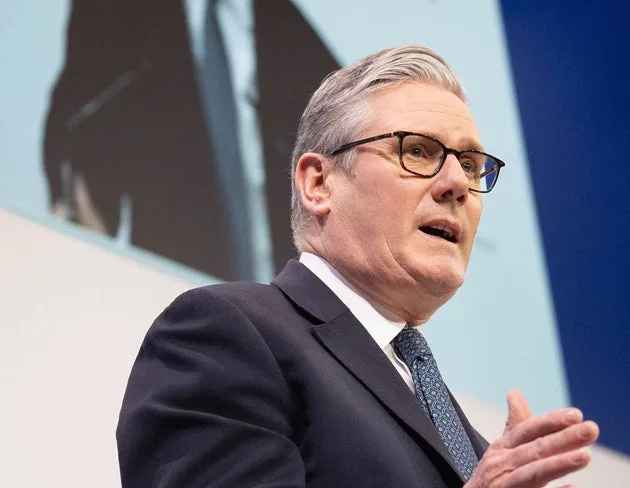Reeves's Tax-Bomb Budget Unleashes Fiscal Fury: UK Economy Braces for Impact

Rachel Reeves's second budget, delivered amidst a chaotic accidental early release of official economic analysis, presented a complex tapestry of progressive social measures alongside significant tax increases, sparking intense debate over Labour's manifesto commitments and the nation's economic direction. The Chancellor claimed to have cut the cost of living and adhered to all manifesto pledges, a bold assertion immediately challenged by opposition leaders and economists who highlighted substantial tax rises.
A central controversy revolved around Labour's tax promises from the last election: not to increase national insurance, basic, higher, or additional rates of income tax, or VAT. Critics, including Conservative leader Kemi Badenoch, argued that Reeves had arguably breached two of these. Last year's 1.2p rise in employers' national insurance contributions, expected to raise £25bn annually by 2028/29, was seen as a "fairly straightforward breach." While Reeves countered that the pledge only applied to employee contributions and "working people," this argument faced skepticism.
This year, Reeves opted to freeze income tax thresholds for three more years than previously planned, a move the Office for Budget Responsibility (OBR) estimates will raise £8bn annually by 2029/30. Although not a direct increase in tax rates, this "stealth tax" is projected to drag more people, including state pensioners, into paying income tax or into higher bands as wages rise. Reeves herself had previously described such a move as hurting "working people," leading to arguments that it contradicted the spirit of Labour's promise to keep taxes on working people "as low as possible." The OBR also noted that Reeves's decisions would push the overall tax burden higher than ever recorded, despite Labour's previous criticism of the Conservatives for similar outcomes.
Among the budget's most lauded progressive measures was the complete abolition of the two-child benefit cap, a policy preventing parents from claiming child tax credit or universal credit for more than two children. This decision, costing £3bn by the end of the parliament, was openly celebrated by dozens of Labour MPs and campaigners, including Helen Hayes and Debbie Abrahams, who stated it would "immediately lift hundreds of thousands of children out of poverty." Ruth Cadbury highlighted that nearly half a million children would benefit. Reeves affirmed she would not "preside over a status quo that punishes children for the circumstances of their birth."
Other popular measures included a new 'mansion tax' – an annual surcharge on homes worth over £2m (£2,500) and £5m (£7,500), collected with council tax from 2028. However, concerns were raised that its projected revenue of £400m by 2031 was modest, and proceeds would go to central government rather than directly benefiting local councils. The budget also announced a gambling levy on online betting companies, significantly increasing remote gaming duty from 21% to 40% and general betting duty from 15% to 25% for online wagers, expected to raise £1.1bn annually by 2029-30. This was met with strong criticism from the industry, which warned of job losses and a boon for the illicit market, though it was welcomed by those targeting harm from online gambling. Horse racing bets were exempted, and bingo duty was abolished.
Further tax-raising measures included capping the national insurance exemption for salary-sacrificed pension contributions at £2,000 annually from April 2029, projected to yield £4.7bn by 2029-30. Income tax rates on savings and rented property will increase by two percentage points from April 2027, and dividend taxes will also rise from April 2026. While the overall ISA limit remained £20,000, the annual cash ISA limit for most individuals (excluding over-65s) was slashed by 40% to £12,000 from April 2027, aimed at encouraging investment in UK equities. A new levy on electric vehicles was also introduced.
To ease the cost of living, Reeves announced scrapping "legacy" costs on energy bills from April, potentially saving average households £150 a year, alongside freezing rail fares and maintaining the 5p cut in fuel duty. The National Living Wage was increased, and the State Pension 'triple lock' committed, boosting pay for workers and pensioners. These interventions, according to the OBR, could knock 0.4 percentage points off the headline inflation rate, central to Reeves's economic strategy to calm bond markets and potentially open the way for Bank of England rate cuts.
The budget also focused on devolution, granting mayors, including Greater Manchester's Andy Burnham, the power to introduce a tourist tax. Billions of pounds were allocated to local authorities through various funds, including a £2.5bn integrated settlement for Greater Manchester, a Local Growth Fund, a Mayoral Revolving Growth Fund, and the National Housing Delivery Fund, to support infrastructure, business development, skills, and housing. Reeves reiterated her commitment to Northern Powerhouse Rail, though specific details of the long-promised project remained unconfirmed.
Economically, the OBR's forecasts presented a mixed picture, with a slight upgrade to GDP growth for the current year but downgrades for 2026-2029. The total tax rises amounted to £26bn this year, pushing the tax-to-GDP ratio to an "all-time high of 38.3 per cent" by 2030/31. The financial markets' initial reaction was volatile due to the OBR's accidental leak, but bond yields later fell, indicating market relief that UK borrowing had not become riskier, a stark contrast to the Liz Truss "mini-budget" debacle.
Politically, the budget garnered a mixed reception. While Labour backbenchers rallied around Starmer and Reeves, celebrating the progressive measures, some privately expressed concerns over the income tax threshold freeze and the overall tax burden on constituents. External criticism was sharp: Kemi Badenoch branded it "higher taxes and out of control spending," while Nigel Farage of Reform UK called it a budget that would do "nothing to help an economy on the edge of a precipice," predicting an "exodus" of wealthy individuals. Public sentiment, as observed in Peterlee, a historically Labour stronghold, revealed disillusionment, with residents feeling the budget offered no coherent drive for growth, questioned tax rises, and voiced concerns about the cost of living and local council tax disparities.
In conclusion, Rachel Reeves's second budget was a high-stakes balancing act. It aimed to assuage Labour's left-leaning wing with significant anti-poverty measures and wealth taxation, while simultaneously attempting to reassure financial markets and address inflation. Despite navigating immediate political challenges and averting an immediate leadership crisis for Starmer and Reeves, the budget faces long-term scrutiny regarding its impact on living standards, economic growth, and the credibility of Labour's fiscal promises, especially as the nation approaches future elections.
Recommended Articles
Starmer’s Election Reversal Sparks Anger as Reform Surges

Keir Starmer's government faced its 14th major U-turn, reversing plans to delay local elections for 30 English councils ...
Starmer Slams Trump's Chagos Deal Stance as US Intelligence Weighs In

Prime Minister Sir Keir Starmer has accused Donald Trump of a 'flip-flop' regarding his support for the controversial Ch...
UK Labour's £2.7bn Heat Pump Push: Warm Homes Plan Sparks Debate, No Gas Boiler Ban

The Labour government is focusing on green technologies rather than insulating homes, launching a warm homes plan with s...
NHS Crisis Deepens: Millions Face Month-Long GP Waits, Patient Satisfaction Plummets

Long GP appointment wait times have soared under the Labour government, with millions of patients facing delays of over ...
Starmer's Beijing Blunder: China Trip Draws Criticism, Reeves Sidelined

Keir Starmer's much-hyped diplomatic visit to China concluded with minimal tangible gains, drawing sharp criticism for f...
UK Economic Jitters: Inflation Surges to 3.4%, Crushing Rate Cut Hopes

The UK's inflation rate surprisingly jumped to 3.4% in December, dampening hopes for immediate interest rate cuts. Drive...
You may also like...
MVP Race in Jeopardy: Top Stars Shai Gilgeous-Alexander and Nikola Jokic Face Eligibility Crisis

The NBA MVP race is under threat as Shai Gilgeous-Alexander and Nikola Jokic near disqualification under the league’s 65...
Post-All-Star Battle: NBA Power Rankings Shake Up the League

Post-All-Star NBA power rankings highlight the Thunder, Spurs, and Pistons atop the standings, while injuries and em...
Netflix Chief Ted Sarandos Heads to White House for Crucial Warner Bros. Deal Talks

Netflix co-CEO Ted Sarandos is navigating complex negotiations for Warner Discovery amidst political pressure from Donal...
Paramount Skydance Faces Q4 Losses, Eyes Bold Warner Acquisition Bid

Paramount Skydance reported a widened Q4 loss driven by declines in TV advertising and distribution, even as streaming a...
Zimbabwe Unlocks Tourism Potential: Lock Brothers Set to Boost Harare's Visitor Numbers

Benjamin Lock is spearheading the development of The Hills Luxury Golf Estate in Harare, aiming to transform it into a p...
Unlock Supercharged Health: Experts Reveal 6 Habits for Enhanced Fat Jab Results & Heart Wellness

A Harvard study reveals that GLP-1 medications, combined with healthy lifestyle habits, can dramatically cut the risk of...
Nvidia Soars Again: Record Quarter Fuels AI Dominance

Nvidia, the world's most valuable company, reported record profits driven by an exponential surge in AI compute demand. ...
AI Unleashed: Gushwork's Search Gamble Pays Off with Early Success

India-founded startup Gushwork has secured $9 million in seed funding to help businesses navigate the evolving landscape...